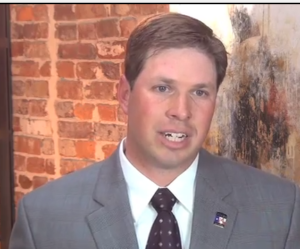Why Farmers Need Crop Insurance
 I always knew I was going to be a farmer. I grew up learning from my grandfather who turned me loose and gave me a lot of responsibility on his farm from a young age. I was driving machinery by the time I was 10-years-old and running my own harvest crew by the time I was 14.
I always knew I was going to be a farmer. I grew up learning from my grandfather who turned me loose and gave me a lot of responsibility on his farm from a young age. I was driving machinery by the time I was 10-years-old and running my own harvest crew by the time I was 14.
When I was in school, I entertained being a veterinarian and farming on the side mainly because people told me it was a tough life and I wouldn’t be able to make a living.
That kind of talk only made me more determined, so when I came home from college I started farming full-time despite the fact that I barely had a dollar to my name and farming is a capital-intensive business.
I remember the first time I went to borrow money, my banker asked me right off if
I had crop insurance and how much was the coverage. I was prepared to answer those questions as crop insurance was then, and remains today, my primary risk management tool. I wouldn’t think of trying to grow a crop without it.
It’s essential — especially for young farmers, like I was at the time, just starting an operation.
It enables farmers to get financing and also enables them to survive a major catastrophic weather event.
Young farmers are particularly vulnerable to such risks because they are more leveraged than more established farmers. They can’t afford a major hit in their finances or a year without any income.
Just look at my state of Texas where we have suffered a historic drought for the last five years. 2012 and 2013 were particularly bad.
Without crop insurance, this sustained drought would have wiped out an entire generation of farmers. They would not have had the means to make it to another year without something to at least help cover part of the losses. That’s why it is critical that crop insurance remain affordable and widely available.
Thankfully the 2014 Farm Bill strengthened crop insurance and added provisions to help beginning farmers. But, the critics of farm policy, including some lawmakers in Congress, never seem to rest and are already clamoring once again for cuts.
They would be wise to take note of an alarming trend that puts the average age of a U.S. farmer at 58. Moreover, in 2012, the number of beginning farmers – those operating fewer than 10 years – was down 20 percent from 2007.
My desire to farm at such a young age is the exception, not the rule. Many young people can’t stomach the risk that is involved and have no desire to try.
Cuts to the farm safety net only make an inherently risky business, riskier. The expense of raising crops, the perils of weather-related disasters, and the low returns on investment, are enough to make anyone run in the other, more secure direction.
Now is not the time to create barriers at the starting point of farming and ranching. Now is the time to give certainty to young people with farm policy they can afford and count on.
Matt Huie farms cotton, corn, sorghum, and livestock in Southeast Texas near Corpus Christi. This op-ed appeared in the Corpus Christi Caller-Times on May 17, 2015.


Trackbacks & Pingbacks
[…] is purchased in advance then some or all of this loss will be covered by the insurance policy. Crop insurance is a management tool that every farmer should have in place to protect themselves from the […]
Comments are closed.